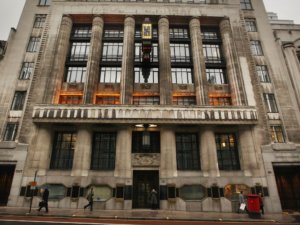Goldman Sachs CEO David Solomon is right!
Working from home should absolutely not be the way forward, and companies closing their office space to make working from home a permanent feature are making a big mistake.

At last, some common sense from a very senior leader within the Tier 1 electronic trading industry.
During recent weeks, large institutions ranging from insurance giant Lloyds of London to Tier 1 FX interbank dealer HSBC have been planning to reduce, and in some cases close altogether, their offices in a rather rash attempt to consider the future to be one in which almost everyone works from home.
Of course, this is preposterous and represents either a short-sighted attempt to reduce costs, or is a kneejerk reaction to having been hit hard by losses caused by draconian government lockdowns.
It is clear that working from home and having no office is not the future, nor is it in any form sustainable.
One sensible voice on this matter is David Solomon, CEO of Tier 1 FX interbank dealer Goldman Sachs, who quite rightly called working from home an “aberration”.
“This is not ideal for us and it’s not a new normal,” Mr Solomon said at a Credit Suisse conference. “It’s an aberration that we are going to correct as quickly as possible.”
Mr Solomon’s comments are the latest in a string of top City and Wall Street executives pushing for a widespread return to the office.
Barclays CEO Jes Staley last month said working from home was “not sustainable” for the bank, because it impacted collaboration and culture at the bank.
Mr Solomon also cited collaboration as a reason to get dealmakers back to the office, as the bank had just 10 per cent of staff in the office throughout 2020, he said.
Goldman’s annual intake of graduates and interns was another reason to phase out working from home. “I am very focused on the fact that I don’t want another class of young people arriving at Goldman Sachs in the summer remotely,” he said.
Well said that man.
Many are taking the opposite, and quite likely incorrect direction.
Yesterday, the world’s ninth-largest Tier 1 FX dealer by market share HSBC confirmed that it will close over 40% of its office space, however, it will retain its full presence in the all-important Canary Wharf.
HSBC is planning to ditch almost half its office space – but insisted it will keep its Canary Wharf headquarters in London.
Posting a 34 per cent drop in profits for 2020 to £6.3billion, the bank said it would reduce the space it occupies by 40 per cent to cut costs and allow staff to work from home more often.
And while its commitment to Canary Wharf will help to rebuild the deserted business hotspot after lockdown, chief executive Noel Quinn said offices elsewhere in the UK were likely to be axed.
Mr Quinn has Quinn trotted out the same line that was uttered by Lloyds of London’s executives recently, saying that there would be a very different style of working post-Covid, where there will be much more of a hybrid model of people working in the offices in a different way, but also working from home where they want to’.
What they really mean is that the financial disaster ensuing from the government’s heavy-handed and draconian obsession with locking everyone down and wrecking the economy has caused a cost issue, and Mr Quinn’s statement is the brightest side from which this catastrophe can be viewed.
London’s position as the global centre for all financial services from the dominance of Tier 1 banking to its unfaltering status as electronic trading talent, infrastructure and corporate capital of the world has remained totally intact throughout the course of 2020.
Despite many other companies have had to close their operations as a result of Boris Johnson’s capitulation to global pressure and disloyalty to his own electorate of small and large business owners who employ the people who voted for him which saw him turn on his public and lock them down, force them out of business and into the dependency of absurd furlough schemes and government-backed debts, causing them to lose their livelihoods and freedoms forever, the banks and fintechs have been carrying on as normal and excelling.
Largely, this is a result of the ability for most to work from home, and certainly, the London-based professionals in the electronic trading industry have never been so busy, their dining room tables now their office, from 6.00 am until the late hours of the evening for most of this year.
We can thank the infrastructure technology sector for this, which is a far cry from when I began my career in this industry 29 years ago, a time at which physical servers and on-site equipment meant there would be no way anyone, even a back-office clerk, would be able to work from home.
Lloyd’s of London chairman Bruce Carnegie-Brown said that coronavirus had sped up the process of it becoming ‘a truly flexible workplace’. Founded in 1686, it is the world’s biggest and oldest insurance market and a pillar of the City of London.
It is housed in a modern-style Grade 1- listed building near the Gherkin but began operating remotely in lockdown.
Switching to a more flexible model would follow moves at many of the City’s big financial firms and now HSBC appears to be embracing this philosophy, which may well save cost on the face of it, but it will absolutely reduce the importance of workplace interaction and synergy with office-based clients.
Mr Carnegie-Brown said: ‘In the longer term, we are likely to see a blended approach that enables the best of remote working with the benefits of a flexible workspace.’
In the case of Lloyds, that was a truly odd decision: at least HSBC is keeping its office rather than transferring everyone to their kitchen tables.
The cost-saving would likely be tremendous, even if HSBC’s staff and names invoice HSBC for their power, telephone and internet usage.
It will be interesting to see how many ECNs, prime of primes and service providing vendors follow this path. My hope is that none of them will, as this is most certainly a bad direction for our industry which needs to be in proper offices, rather than remote.
It is a relationship and talent business, and these two important factors, combined with the interaction with technology and proper professional facilities are vital tenets.
Let’s hope that Lloyd’s bad decision does not influence the rest of us and that HSBC does not go down the work from a home route in full.
Mr Quinn added: ‘We will always have the building here in Canary Wharf, this will be the primary London office. We’ll probably release premises elsewhere in London that are coming up for lease renewal over the next two to three years.’
Even before the lockdowns battered profits, HSBC was trying to cut costs and focus on its more profitable businesses in Asia. It is planning to shift capital to Hong Kong and focus on its wealth management arm there, in an effort to grab a portion of the growing number of well-off citizens.
However, its efforts to grow in the East while retaining a foothold in the West have angered MPs. In an uncomfortable grilling by the Foreign Affairs Committee last month, Quinn was accused of aiding and abetting one of the biggest crackdowns on democracy’.
The biggest affront to democracy is, however the lockdown and those capitulating to it by closing their offices.









